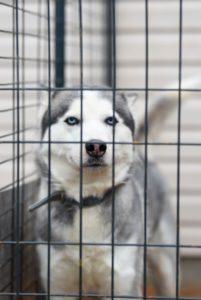
Here are some of the benefits and best practices to consider when using a crate to facilitate recovery after veterinary surgery.
Any medical procedure can be stressful for your companion, but some surgeries require strict rest and immobilization after the fact. Your veterinary care team may recommend crating your dog after veterinary surgery to ensure a peaceful recovery and avoid further injury. While some guardians find crate rest difficult, it can help your companion avoid tearing out stitches or straining sensitive muscles or joints. Here are some of the benefits and best practices to consider when using a crate to facilitate recovery after veterinary surgery.
Crating Can Ease Recovery After Veterinary Surgery
Dogs can let their enthusiasm and exuberance get the best of them, even when they are recovering from surgery. A well-intentioned jump, roll, or wiggle can leave your fur-baby in pain, setting back recovery and making pain management more challenging. Keeping your companion immobile can be critical for certain injuries, so be sure to discuss crate rest or room restriction with your veterinary surgery team. For many orthopedic and soft tissue procedures, crate rest can be required for a period as short as a few days and as long as a few months. Your veterinary care team will likely discuss your companion’s limitations with you and provide guidelines for activity throughout the recovery process.
Practical Concerns for Crate Rest and Room Restriction
Both crate rest and room restriction are common recommendations for recovering dogs, but the best option for your companion will depend on a few factors. Your veterinary care team will likely provide guidance, and the duration of your fur-baby’s prescribed rest will depend on their size, age, energy level, and the operation from which they are recovering. An excitable Chihuahua puppy will probably require more strictly-imposed rest than an old, mellow basset hound. In any case, be sure to choose a crate that is small enough to limit movement, yet large enough for your companion to stretch out, stand up, and turn around. Lidded enclosures are preferable, as they deter jumping. If room restriction is recommended, create a recovery suite that includes all of your companion’s necessities and be sure to block furniture and other hazards.
Keeping Your Companion’s Spirits Up
Crate rest can be difficult for fur-babies and guardians alike. Keeping your canine crated even once they begin to feel better is often necessary, as injuries can occur well into the recovery process. Your companion will likely want to play, and keeping them engaged and comforted is crucial. Choose comfortable and supportive bedding, provide plenty of stimulating toys, and be sure to interact with them often.
Trust Maryland Veterinary Surgical Services With Your Companion’s Health
Your companion’s health is important, and the team at MVSS is ready to provide the best care possible for your furry family. We are dedicated to combining comprehensive exams and assessments with informative and honest discussions of your companion’s care. Once we have worked with you to decide on the best course of action for your dog, our professionals will use their surgical expertise to work towards the goal of giving your companion an active and pain-free life. We are proud to serve loyal companions in Catonsville and Baltimore. To learn more about our services, give us a call at 410-788-4088 or visit us online. For more information and tips for pet health, follow us on Facebook and Pinterest.
